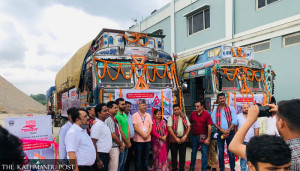Money
Jajarkot becomes self-reliant in veggies
Jajarkot has become self-sufficient in vegetable crops and shaken off a prolonged food deficit, the Agriculture Development Office said.
Bhim Bahadur Singh
Jajarkot has become self-sufficient in vegetable crops and shaken off a prolonged food deficit, the Agriculture Development Office said.
After a large number of farmers adopted commercial vegetable farming, this remote hilly district in the Mid-Western Region now produces a surplus which it ships to other districts. Quick and high returns from growing vegetables have also helped to stem migration to India to some extent.
Kalu Devi Pun, 45, of Bherimaalika has been engaged in commercial vegetable farming for the last nine years. She earns Rs500,000 annually by selling her harvests. Pun has invested the money from vegetable farming in her children’s education. She has succeeded in making her son an engineer and her daughter a staff nurse with the money she earns from growing vegetables.
Likewise, another farmer Kebal Bharati of Kastara earns Rs400,000 annually from vegetables. More than 100 farmers in the region have been making good money by cultivating vegetables.
As a large number of farmers are involved in commercial farming, Jajarkot doesn’t need to import vegetables anymore, said the office. The district has started supplying its surplus produce to surrounding districts like Rukum, Salyan and Surkhet, said Chitra Bahadur Rokaya, senior agriculture development officer of the District Agriculture Office. “Jajarkot now ships more than 2 tonnes of vegetables daily to other districts,” he said. “Until two years ago, it depended on vegetables brought from Nepalgunj, Surkhet and Rukum. The scenario has changed. Commercial farming has made the district self-sufficient now.”
Villages like Eever, Matela and Kastara have been earning more than Rs15 million annually. The District Agriculture Office has declared these three areas as vegetable pocket areas due to their high potential to produce seasonal and non-seasonal crops. Farmers have been producing vegetables in a three-crop cycle each year, and it has increased their incomes significantly. The rise in earnings from seasonal vegetables has changed the living standards of the people.
In the past, locals used to migrate to India to work. “Nowadays, they are seen working on their farms,” said Kalu Devi. Vegetable prices depend on the season, she said. Sometimes vegetables cost Rs30 per kg while at other times the price surges to Rs60 per kg. Prompted by the expansion of vegetables farms and production, the agriculture office has constructed a vegetable collection centre at Matela. Various farmer groups have been running the collection centre.
According to Rokaya, farmers have been demanding that the government develop irrigation and roads as they want to enlarge their market due to growing demand.




 9.12°C Kathmandu
9.12°C Kathmandu














